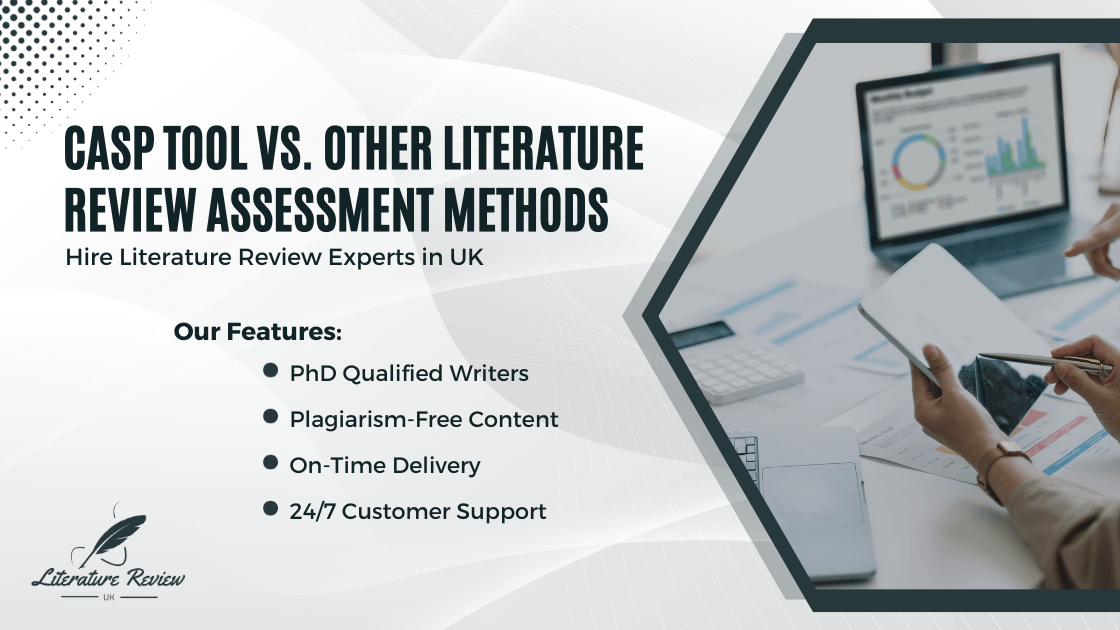
In the realm of literature review assessment, the choice of the right tool is crucial. Among the various options available, the CASP (Critical Appraisal Skills Programme) tool stands out as a well-recognized choice. However, it’s essential to explore its pros and cons in comparison to other assessment methods for literature reviews and systematic reviews.
The Significance of Critical Appraisal
Before delving into the CASP tool’s strengths and weaknesses, let’s understand why critical appraisal is a fundamental step in any literature review.
Critical appraisal serves the following essential purposes:
- Quality Assessment: It helps assess the methodological rigor and trustworthiness of research studies, ensuring that only credible and relevant sources are included in your literature review.
- Bias Identification: Critical appraisal tools highlight potential biases, limitations, and weaknesses in research, enabling you to make informed decisions about the relevance of each study to your review.
- Research Synthesis: Through systematic critical appraisal, you can synthesize the findings and evidence from a range of studies, providing a comprehensive and robust review of the literature.
-
Gaps and Recommendations: It guides you in identifying gaps in the existing literature and making recommendations for future research.
The CASP Tool: An Overview
The CASP tool is one of the most widely used critical appraisal tools, recognized for its structured approach and versatility. It offers a set of checklists specifically tailored for different study types, making it suitable for assessing various research designs.
The CASP tool covers a wide range of study types, including:
- Randomized Controlled Trials (RCTs)
- Cohort Studies
- Case-Control Studies
- Qualitative Studies
- Systematic Reviews
- Diagnostic Test Studies
- Economic Evaluations
This flexibility makes the CASP tool an attractive choice for literature review assessment.
Pros of the CASP Tool
1. Versatility
The CASP tool’s versatility is one of its primary advantages. Researchers and students can use CASP to critically appraise a variety of study designs, from qualitative research to systematic reviews. This adaptability is particularly valuable in interdisciplinary fields where different research methods are employed.
2. Structured Framework
The CASP tool provides a structured and comprehensive framework for critical appraisal. Each checklist guides users through essential aspects of research quality, such as study design, sample selection, data analysis, and reporting. This systematic approach ensures that all key dimensions of a study are thoroughly evaluated.
3. Wide Acceptance
The CASP tool’s widespread use in the academic and research community lends credibility to its assessment. Many institutions and journals recognize the CASP tool as a reliable method for evaluating research quality, making it a valuable asset for researchers and students seeking broader recognition.
Cons of the CASP Tool
1. Learning Curve
One of the potential drawbacks of the CASP tool is that it may have a steep learning curve for beginners. New users may require some time and guidance to become proficient in applying the checklists effectively. However, various training resources and workshops are available to address this issue.
2. Focus on Methodology
The CASP tool emphasizes methodological aspects of research, which can sometimes overshadow other essential components such as the relevance of the study to a specific research question. Researchers should use the tool judiciously, ensuring it aligns with the objectives of their literature review.
Alternatives to the CASP Tool
While the CASP tool has its advantages, other critical appraisal methods offer unique benefits, depending on the context of your literature review.
1. JBI (Joanna Briggs Institute) Critical Appraisal Tools
The JBI offers a set of critical appraisal tools designed for systematic reviews, text and opinion papers, and other study types. These tools provide specialized assessment criteria for specific research designs, ensuring in-depth evaluation.
2. AMSTAR (A Measurement Tool to Assess Systematic Reviews)
AMSTAR is tailored for the assessment of systematic reviews and meta-analyses. It focuses on the quality and reporting of systematic reviews, helping researchers determine the reliability of these comprehensive studies.
3. ROBIS (Risk Of Bias In Systematic Reviews)
ROBIS is a tool dedicated to assessing the risk of bias in systematic reviews. It is particularly valuable for those conducting reviews of reviews, where the focus is on the reliability of systematic reviews as a whole.
Pros and Cons of Alternative Tools
Pros of Alternative Tools
- Specialization: Alternative tools often provide a specialized focus on certain study types, ensuring in-depth evaluation.
- Simplicity: Some tools are designed to be user-friendly, reducing the learning curve for beginners.
- Robustness: For specific research types, alternative tools may offer more robust assessment criteria, enabling researchers to uncover nuanced details.
Cons of Alternative Tools
- Limited Versatility: Specialized tools may not cover as wide a range of study designs as the CASP tool.
- Recognition: While some tools are widely recognized, they may not enjoy the same level of universal acceptance as the CASP tool.
Conclusion
Selecting the right critical appraisal tool for your literature review is a decision that requires careful consideration. The CASP tool is a versatile, well-structured, and widely recognized choice, making it a valuable asset for researchers across disciplines. However, it is essential to be aware of its learning curve and potential bias toward methodological aspects.
Alternative critical appraisal tools, such as those offered by the JBI, AMSTAR, and ROBIS, provide valuable options when specialized focus and simplicity are required. Researchers should choose the tool that aligns most closely with their specific literature review objectives and study designs.
In the end, the choice of the right tool is a crucial step in ensuring the credibility and quality of your literature review. Consider the pros and cons of each tool, and let your research objectives guide you toward the most suitable critical appraisal method for your review.




